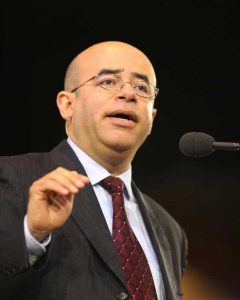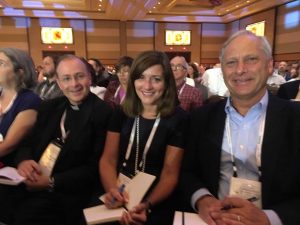Convocation of Catholic Leaders Day 2

Dr. Hosffman Ospino —
CNS photo/Bob Roller
St. Augustine’s praise of God himself can be sung of his bride, the Church as well. The unchanging beauty, truth and goodness that she is is always becoming new through the incessant creative force of the Holy Spirit. The bride of the Wounded Savior and host of the Sweet Guest of our souls is both strong and wounded, both unchanging and new.
The second day of the convocation began with Archbishop Wenski of Miami reminding us of the history of Catholicism in the United States, tracing the ways that missionary discipleship has shaped the country and the Church over the last 400 years. He told us that we are a part of this Catholic tradition of bringing the gospel to new American peripheries with joy and in innovative ways that respond to the needs of today.
Fr. Thomas Gaunt, S.J., of the Center for Applied Research in the Apostolate led us through an exposition of a changing landscape in culture and the Church in America. He introduced us to research that the United States Conference of Catholic Bishops had done to try to understand what it meant to be Catholic in America. The research showed that in a church of 75 million American Catholics, 25 million do not go to Mass regularly, but still had a strong interior need to self-identify as Catholics. Why? The answer to that question is where the key to the new evangelization lies. It shows that the Catholic identity given to us in our baptism is an indelible mark. The sacrament is a moment when God burns his image into us and our identity. It implies that Catholicism is something deeper than ‘what we do’ in the Church and it shows that God never, ever gives up on us, no matter how many years we have given up on him.
Bishop Wenski helped us to gently shift our paradigm of seeing Catholics who have fallen away from practicing the faith as no longer part of the Church to seeing them as God’s own children who never cease to be His no matter what their moral choices are.

Some of the Regnum Christi delegation listen to Archbishop Wenski encourage us to be joyful missionary disciples.
These are the people on the peripheries that Pope Francis urges us to go out to, in our families, in our parishes and on the fringes of our society. Francis’ insistence that we reach them, embrace them and include them is not to change the ever ancient teachings of the Church, but to embrace the people who have never ceased to be our brothers and sisters, the church’s children who are a part of this family and will never be less than that. If we who love our Church don’t see them that way, how will they ever know themselves who they truly are?
“Just as we knew in the early 20th Century that welcoming immigrants would be a richness for the country and the church, we must know now that immigrants are neither the enemy nor a threat.”
Dr.Hosffman Ospino of Boston College continued the exposition of the landscape by introducing our time as the largest demographic shift in the American Catholic Church since the immigration of the early 20th century. Churches in the Northeast and mid-west are consolidating and closing while the Church is exploding in the South and the West of the country. “The future of U.S. Catholicism is being forged in areas once not central to U.S. Catholic life. … Are we paying attention?” he asked.
He laid out the facts that “half of U.S. Church members today are non-European, with about 40 percent Latino, 5 percent Asian and Pacific Islanders, 4 percent African-American and 1 percent Native American. These numbers contrast with the Church population of 50 years ago, when 80 to 85 percent of Catholics were of European descent.”
The Hispanic church is a periphery among us, isolated by language barriers, cultural isolation and economic struggles. And it isn’t the only periphery. We also have the periphery of 50% of the church who may look successful and strong in the pews and in culture, but are crumbling inside because of the forces of secularism, individualism, the culture wars, family breakdown, isolation, addiction and myriad other problems. We need to acknowledge that in some way, we are all on the periphery- either cultural or existential.
Perhaps we are each other’s solution. We are each other’s mission field, and in communion Christ heals and builds His church. Perhaps the answer to the desire for inclusion and embrace Hispanic Catholics experience is best met by entering the lives of Anglo-American Catholics whom Christ ministers to through the warmth and joy that the Hispanic Church has. Perhaps bringing us together as one body is how Christ cures this body, His Body, of our ills, or at least shows us that we are not alone in our suffering. This isn’t just a platitude. This is the factual way Christ has chosen to reveal himself to us through history. He made us for communion in Him and reveals himself and his love to us through each other. It’s radical and counter-cultural to intentionally build communion in a throw-away culture of isolation and individualism that proclaims the individual as his own savior.
Perfect Love Casts out Fear
Change is difficult and instability can breed fear. Many of us in the Church today fear the changes in the Church and their implications, but they cannot be ignored. The Holy Spirit, the innovator, is working in the changing cultural landscaping and renewing the Church in a time of woundedness, as He always has throughout history.
In Greek there is a word for the time we are in: krisis. It is the space between what is passing and what is to come. It’s a difficult, uncomfortable and unstable moment. It’s the in-between. Cardinal Dolan spoke of our time as not being an “age of change, but a change of age.” In this time we need to accompany each other, with confidence in Christ and His Church, not in fear, following the Holy Spirit with trust as he creates kairos, a new time, a new era in which we proclaim the ever ancient, ever new message of the Gospel with Joy.
Truth never changes. We have to let go of that fear and stand on a solid foundation of truth while looking for innovative ways to live love.
